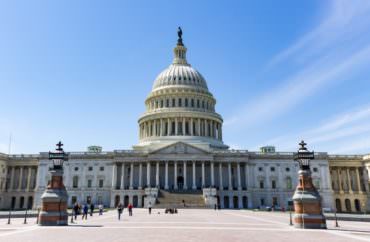
Has support from two leading liberal politicians
A handful of education unions and a liberal think-tank have called on President Joe Biden and Congress to adopt a “New Deal for Higher Education.”
However, progress on the initiatives pushed by the American Association of University Professors, the American Federation of Teachers and the Roosevelt Institute, appears stalled in Congress. Despite a Democratically-controlled Congress and White House, the groups have seen minimal support for the agenda three months after the release of its December 2020 report developed by the Roosevelt Institute.
Supporters of the agenda are hoping for greater intervention into higher education by the federal government. Areas of focus in the report from the liberal think-tank include “making college truly affordable”, “improving labor practices” and “creating stable, equitable streams of public funding.”
The AAUP did not respond to two emailed requests sent to its general media relations email in the past three weeks asking for examples of legislation that fulfilled its agenda. Oriana Korin, a spokesperson for the AFT did not respond to similar emailed requests for comment from The College Fix.
MORE: Teacher union leader tells members to ‘fight’ for Biden’s agenda
The Fix reached out to the Roosevelt Institute seeking comment from the three authors of the report Suzanne Kahn, Jennifer Mittelstadt and Lisa Levenstein but all were too busy according to a media relations representative to answer questions about specific legislation and cost of implementation of the agenda.
Ariela Weinberger, a spokesperson for the institute, said that “due to scheduling” the researchers would not be able to respond to requests for comment.
Last week, President Biden signed the American Rescue Plan into law, the newest COVID-19 relief bill.
One section of the act alters existing law to make any forgiven student loans non-taxable income for the next five years, laying the groundwork for student loan forgiveness through executive action.
However, besides this section and some increased funding to schools, most of the agenda has gone nowhere.
Politicians in support of the agenda have introduced few pieces of legislation
Senator Elizabeth Warren and Representative Ayanna Pressley, both Democrats representing Massachusetts, spoke to activists with the union groups during a February 10 launch event.
However, even they have presented few pieces of legislation directly related to the agenda, according to an analysis by The Fix.
Pressley’s February 4 resolution calls on President Biden to forgive $50,000 in student loans through executive action. It remains in committee as of March 17. Biden has previously ruled out forgiving student loans beyond $10,000 through executive action.
Meanwhile, Warren has introduced few pieces of legislation relating to the agenda, though she is a co-sponsor on a March 1 bill to exempt student loan forgiveness from taxation. The bill has not been assigned to a committee as of March 17, but it is similar to language included in the relief plan.
Education expert warns of high costs
While advocates of the proposals did not provide comment, at least one higher education expert warned about the costs and economic consequences of the proposals.
“The proposed New Deal for Higher Education is a horrible idea on many different levels,” Jay Schalin, the director of policy analysis for the conservative James G. Martin Center for Academic Renewal, told The Fix via email.
He said that “higher education is already suffering from harmful economic distortions brought about by the growing infusion of government money,” including federally-guaranteed student loans.
He said:
With the federal government pouring money into higher education, academia will lose whatever independence from the government it has left. Right from the start, the New Deal mandates that colleges institute extreme progressive policies that will make academia even more one-sided politically than it already is.
Cancelling student debt is inherently unfair, pushing the burden for the actions of individuals who (ostensibly) benefited from borrowing that money onto those who gain no such benefit—the taxpayers.
Schalin said the White House “should do nothing to fix higher education but instead get out of the way.”
Also, it should stop the massive expansion of the labor force through immigration, both legal and illegal,” Schalin said.
“Government interference in education and manipulation of the labor supply have distorted the labor markets almost beyond repair,” Schalin said. He said “without those distortions, many of the problems surrounding higher education will fix themselves.”
“Unfortunately, this new administration is likely to meddle even more than its predecessors,” Schalin said.
MORE: COVID legislation gives extra money to federal workers if kids aren’t in school
IMAGE: Sherry Smith/Shutterstock
Like The College Fix on Facebook / Follow us on Twitter






Please join the conversation about our stories on Facebook, Twitter, Instagram, Reddit, MeWe, Rumble, Gab, Minds and Gettr.